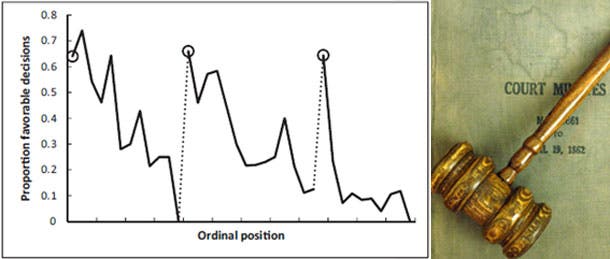Law is a highly demanding field, in which its practitioners are required to have an objective and stoic approach at all times, but a recently published very interesting study shows that court judges can be just as biased as any of us and their rulings, however rational we’d love them to be, are influenced by moods and swings, and … lunch breaks.
Shai Denzeger from Ben Gurion University of the Negev studied 1,112 parole board hearings in Israeli prisons, over a ten month period, to see weather there’s a correlation between the proportion of favorable/negative parole hearings and the order in which they’re presented to the judge during the day. The results of the study can be observed in the graph below which features on the vertical axis the proportion of cases where the judges granted parole, while on the horizontal axis the order in which the cases were heard during the day is shown – the dotted lines represents the moments of the day in which the judges went for their snack breaks.
If some of you might have been amused at the beginning of the article, then there’s a good chance you’re pretty amazed right now, maybe even scared. Yes, in the beginning of the day the chance a prizoner has of a parole being granted is around 65%, only to plummet to nearly 0% towards mid-day!
The rulings researched in the study were made by eight Jewish-Israeli judges, each with an average of 22 years of judging behind them. Their verdicts represented 40% of all parole requests in the country during the ten months. Every day, each judge considers between 14 and 35 cases, spending around 6 minutes on each decision. They take two food breaks that divide their day into three sessions. All of these details, from the decision to the times of the breaks, are duly recorded.
Jonathan Levav, who led the study, says, “There are no checks about the judges’ decisions because no one has ever documented this tendency before. Needless to say, I would expect there to be something put into place after this.”
Denzeger’s explination is a simple one: repetitive action leads to intense mental resources depletion and fatigue, which leads to something called “choice overload”. When this happens, basically, we generally tend to choose the default option, in this case the default option is “deny parole”.
Nita Farahany, a professor of law at Vanderbilt University, says, “To me, this study underscores that decision-making is complex and does not occur in a theoretical or formalistic vacuum.” She says that similar studies have found that people from medical residents to air force pilots make more errors when they go for long periods without rest.
“Such studies have helped inform policy changes designed to minimize human errors that arise from lack of sleep, and mental and physical exhaustion,” Farahany says. “That legal decision-makers might also be impacted by mental or physical exhaustion should be unsurprising. Improvements in medicine, military combat, and other critical decision-making contexts have required that attention be paid to the effects of exhaustion. Likewise, improvements in the justice system may likewise require that society acknowledge the effects of biological contributions to legal decision-making.”
Study published in the Proceedings of National Academy of Sciences.










